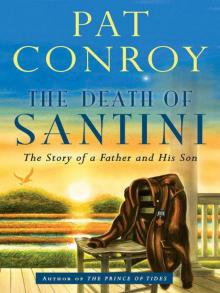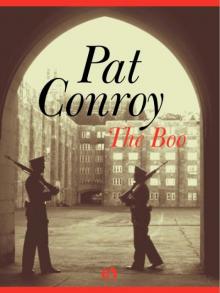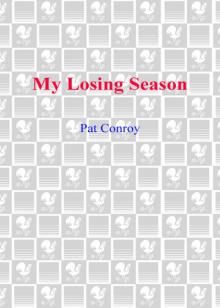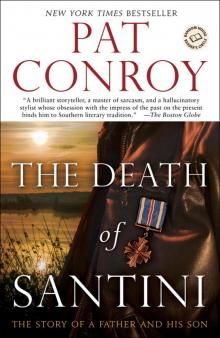- Home
- Pat Conroy
The Death of Santini Page 12
The Death of Santini Read online
Page 12
CHAPTER 7 •
Two Premieres
My mother’s humiliation at not being invited to the Trask party turned out to be nothing compared with what was to come, when the premiere of The Great Santini came to Beaufort.
Peg Conroy’s most ardent desire was to have complete access to the crème de la crème of whatever society she found herself in, in whatever part of the country we were passing through. Her model for both imitation and inspiration was that cunning, treacherous beauty from the plantation South, Scarlett O’Hara. I think my mother saw her entire life as her becoming an amorous survivalist in a world dominated by men, a crucible of mysteriousness the only weapon at the disposal of a woman who was both desirable and unreadable at the same time. Miss Scarlett gave Mom the white-throated image of the ivory-skinned woman who lived in immaculate cameos throughout the South. My mother willed herself to be one of those pampered women of the cameos.
She also dressed for the part with chicness and finesse. Her embittered daughters still talk with envy about my mother’s lavish wardrobe and they both insist my mother was the only woman on base who had her own personal dressmaker. All I know for sure is that Mom looked scrumptious whenever she went out of the house and that she made Dad a handsomer man than he actually was. She dressed her children as though we were foundlings—with the girls, it was particularly cruel, and she seemed to go out of her way to make my two pretty sisters as unattractive as possible. They were given eyeglasses that looked like they were made from fins of Chryslers. The boys didn’t count when it came to what we wore, and the siblings still get together and howl with laughter when we look at albums of our growing-up years. In some photographs, I see Tim and Tom wearing shirts I wore ten years before they were even born. But our mother was always ready to step out onto the veranda at Tara toward her fateful deliverance at the party at Twelve Oaks. Through an act of homage and will, she lived the life of Scarlett O’Hara. Everyone we met referred to her as a Southern belle and she did nothing to disabuse them of that notion. Beauty was her letter of transit out of the mean Appalachia.
Though my mother’s imitation of the Southern belle was well rehearsed, it lacked authenticity. She lacked the quiet confidence that comes from the leisure and gracefulness of coming up right. Social ease issues out from the accumulated weight of generations of high achievers. Fashion and style were not tests you could study for—they were endowments passed down by families with the weight of culture behind them and the emotional dowries to back them up. Mom would wear the hills of Piedmont into whatever ballroom she entered, and her children would wear these same hills plus the wounds of slipshod, madcap Ireland wherever we roamed. Your birthplace is your destiny and it hunts you down in whatever cotillion you’ve run to hide in—it is a bad tattoo that is defining, accurate, and irremovable. My poor mother thought she had fooled everyone, but in the end, she barely fooled anyone, and especially not her children.
It began to come apart for my mother after her divorce from Dad. Overnight, my mother became a desperate, nearly hopeless woman. Though Mom had never drunk in her life, I heard rumors that she was now drinking heavily and even sleeping around. The kids were worried about her, and I think my brother Jim was simply disgusted with her. Then I heard a story that truly alarmed me and set me on the road to Beaufort at full speed.
When I got to Mom’s house, we drove out to the beach on Hunting Island and we walked to the south end of the beach talking about everything. Mom told me, “I think I’m going crazy, Pat. I really do. I’ve lost all status and respect in this town. I used to be asked to serve on boards and was invited to the biggest parties. That’s over for me. Some of these bitches won’t even talk to me now.”
“Have you been smoking dope with their kids, Mom? That’s what I’d heard in Atlanta.”
“Of course not! I’ve never even seen marijuana. I don’t know what it looks like,” she said. “How dare you believe those lies they’re talking about me?”
“I was just asking. That seems like a big response from an innocent woman.”
“Beaufort is making me paranoid. I can feel the people talking about me. Watching me from behind their window shades. Everyone’s waiting for me to make a mistake. When I first came here I was the most popular woman in town. Now they act like I should be put out with the morning trash.”
“I’ve got a suggestion, Mom. Let me send you to college.”
“That offends the very core of my being,” she said. “So even my son doesn’t think I’m smart enough. Even you’ve betrayed me while I’ve lost my way temporarily. Son, I was like a prisoner in your father’s house for thirty years, saddled with all those kids and no life of my own. I’m having some fun, Pat, just a little fun. Maybe I’m sowing a few wild oats. Kicking my heels up before I have to get married again. Besides, I graduated from Agnes Scott with honors.”
“Just be careful, Mom. Beaufort can turn mean in a heartbeat.”
“I think my redneck roots are showing through, and the mountain girl is finally up in arms. I come from bootleggers and murderers and they don’t want to mess with pistol-packing Mountain Peg.”
“Oh? When did Miss Scarlett die?” I asked, and my mother ran into the ocean laughing.
On one of my visits to Beaufort during the filming of the movie, I went to a bar above Harry’s Restaurant to meet with Mom and Dr. John Egan. Mom had gotten together a cordial group of ten to twelve neighbors from Beaufort. Many were pals of Dr. Egan’s, and had spent their lives on bases around the world. They were sophisticated and comfortable with themselves, and told great stories.
Toward the end of the evening my mother struck a wineglass with a teaspoon to get everybody in the restaurant’s attention. She took well to the limelight and glowed with a peculiar shine of pleasure surrounded by her friends and her oldest son. I remember being proud of the fact that she was so pretty and liked to be around old boys who appreciated that beauty.
“I’ve got an announcement to make and I wanted Pat to be here when I made it. Last night, I got a phone call from Charles Pratt, who is the producer of The Great Santini. Mr. Pratt said he and the studio had thought about the opening of the film being in Hollywood. Some wanted it to open in Toronto, others in New York. ‘But then it hit us all,’ he said. ‘Let’s open the movie in Beaufort, where Pat lived the life and wrote the book that brought us all to that beautiful part of the world.’ ”
A cheer went up from the patrons in the restaurant, and the rumor hit the streets.
“Charles Pratt promised me that this premiere is going to be one of the biggest blowouts this town has ever seen. He said it would be the hottest ticket in town. I want to invite all of you to come to help me celebrate what I know will be one of the most joyous nights of my life,” my mother said as friends came up to hug and congratulate us.
When I left the next morning for the long drive back to Atlanta, I gave my mother a cautionary warning: “Mom, I would tone down your triumphalism about the premiere coming to town. Ease up on the pedal when you start bragging about me.”
“I’ll brag about you all I want. Don’t think those women who have a lawyer or a doctor in their family don’t run their mouths every time they see me. One of the pleasures of being a mother is bragging about your kids.”
“Then brag about the other ones. I’m afraid this will get back to the kids and hurt their feelings.”
“No, no, this is your negativity again. You’re trying to squelch my fun when I’m just starting to have some, and I won’t let you do it. You never enjoy any of the good things that’ve happened to you. Not one thing. You see the dark side of everything.”
“I don’t trust the world. I’m cautious about it. I don’t know how it will come, but there’s always trouble lying ahead.”
“You watch for the trouble all you want,” she said. “I plan to enjoy the ride.”
I went back to writing and editing The Lords of Discipline and I realized that I could finally make a sentence sound exactly how I
wanted it to sound. Under my editor Jonathan Galassi’s watchful eye, I wrote scenes and tightened others and have rarely enjoyed working on a book with such passion and ardor—I looked at what I did for a living and adored making the English language sing and strut on a sheet of yellow legal paper where I wrote it down in my own handwriting. The book would be published by Houghton Mifflin on the fall list, about the same time the Santini movie was being released around the country.
But there were storms passing through in my own life that I could not ignore. I had fallen in love with a fetching woman named Lenore Fleischer, who in the next ten years would ruin my life and lead me into a suicidal spiral that I thought I could never recover from. She failed to tell me she had gone off birth control three months before our wedding, then surprised me by getting immediately pregnant, maybe even on our wedding night. Her rodentlike, morally repugnant ex-husband was suing me so often in the Atlanta courts that I would end up taking the whole family off to live in Rome, Italy, for three years in the eighties, mostly to get away from him. In Rome, I finalized two hundred and fifty pages of The Prince of Tides, but Jonathan Galassi had stunned me by taking a job with Random House and wanted me to make the move with him. When I visited the new office of Jonathan at Random House, it soon became apparent that the editors and publishers at that august publishing house had no interest in my writing career and almost none in Jonathan’s either. We were insulted in every office to which he took me. I never felt like more of a Southern hick, toothless and feckless with holes in my shoes, than I did for those two shameful hours wandering the halls of that gutless company. Jason Epstein has no idea how close I was to breaking his bigmouthed jaw when he mortified a crestfallen Jonathan in front of me and refused to raise his eyes to meet mine, nor his hand to shake mine in friendship. He was a braying, overbearing man, not a lonesome dove among his discourteous colleagues. I sprinted out of Jonathan Galassi’s life and Random House went on to fire him in 1986. He went to Farrar, Straus, and Giroux and succeeded in becoming one of the most successful and distinguished publishers in New York history. I ran back to the warm embrace of Houghton Mifflin and fell under the sway of the glorious Nan Talese. Nan would later receive the first Maxwell E. Perkins Award for lifetime achievement in editing. Two years later Jonathan Galassi won the third Maxwell E. Perkins Award. My life as a writer has been a well-cobbled one; I was lucky to work with editors of supernatural gifts. At times, I made a ham-fisted unruly guest in their stable of writers, but we did some good things together that I’ll always be proud of.
Then The Great Santini premiere made a full-fledged charge at my mother’s poor artless heart. The strategy caught the whole family by surprise, but it was admirable in its cunning and its blitzkrieg swiftness.
Every morning, Dad would join me for coffee in my living room in Atlanta, where we’d dissect the Atlanta Constitution and talk about the news of the day. At the beginning of the summer, I could tell that Dad’s excitement about the premiere was rising as he began talking about how many of his brothers and sisters he could sneak in the back door. He talked about the Conroy kids and their families all sitting in a group and then said, “In the best seats in the house, of course.”
“Dad,” I warned, “I don’t know where the premiere’s going to be. The theaters in Beaufort are the size of kayaks.”
“Hey, you and I are the whole show, son,” he said. “They can’t do it without us. Your mother’s right, Mr. Negative. Sheesh.”
The news came to my mother on a Monday afternoon. Dr. Egan reported that Mom cried out when she received the devastating news of how many premiere tickets were allotted to the Conroy family. She went to argue her case the next day with the same result and the insistency that the allocation of the tickets was irreversible and nonnegotiable. Dad came over to my place on a rare nightly visit and his look was distraught.
“Your mother needs you, son. She needs you bad,” he said.
“How in the hell would you know she needs me? You two haven’t talked in years,” I asked.
“Her husband, John Egan, called me. He asked that we keep his call secret from your mother. But he says that she needs you more than she ever did. Beaufort got her again. But this time, it really got her.”
In what was becoming another great circle in my life, I pushed off for Beaufort the next morning, even though I lacked any clue of what had mortified Mom this time. Though I’d called her after talking to Dad, she was far too hysterical to talk to me on the phone. As I drove along the forested borders of I-20, I went over every single thing that could’ve gone wrong, but I could come up with no scenario that could’ve sent my mother into this paroxysm of rage and shame. She could handle her rage just fine, but shame always brought her to her knees. The way an Inuit knows a thousand forms that snow can take, I knew all the separate registers and cries that mother’s lifelong vocation of twisting the claws of her shame could take.
Dr. Egan was downstairs when I came in the back door. The tide was high and there was a soft breeze that seemed to carry a little of the river with it, while the sun shone off the bay giving it a milky, opaque light. The doctor pointed upstairs and I headed to the bedroom.
I knocked softly on the door and heard Mom’s frailest voice asking me to enter.
“I heard they’ve been messing with my mama again,” I said.
It did not have the calmative effect on my mother I was hoping for. Instead, she put her face into a very wet pillowcase and sobbed to the point of screaming. Massaging her shoulders, I tried to get her to tell me what was wrong, but she began saying things like, “I told John that we were moving out of this goddamn hypocritical town—maybe move to Lake Lure, where Stanny had a home, or to Asheville, where I’ve always wanted to live. But it’s farewell to Beaufort. Goddamn little crapola of a town! I can never walk down its streets again—ever. I’d have to wear a Halloween mask or a bag over my head.”
“Just tell me what happened, okay?”
“I got a call from the head of the Great Santini premiere committee,” she said.
“I didn’t know there was such a committee.”
“Neither did I, until I got the call,” Mom said.
“Who is the chairman of it?” I asked.
“Col. Paul Sigmund,” she said. “He flew with your father in the Marine Corps. I met with him at his office and he told me that all the plans have been solidified for the premiere.”
“It’s his job,” I said. “No harm in that.”
“I asked him how many seats my family was allotted,” she said, and I could tell by her voice that she was lining up to place the sword into the bull’s spine.
“Do tell,” I said.
“Three,” she said.
“Three?” I echoed, realizing that the skimpiness of the number had taken me by surprise.
“One for me. One for your father. And one for you,” she said.
“It seems I have business with Colonel Sigmund this morning,” I said.
“He’s expecting you,” Mom said. “He told me you’ve no chance to change his mind, and no matter what you say it will not affect the decisions of the great premiere committee.”
I looked at my mother. “Wanna bet?”
The committee worked out of a simple office in downtown Beaufort. My mother was right: Colonel Sigmund was waiting for me with I thought a little too much emphasis on being confrontational and not enough on being conciliatory. After we exchanged pleasantries about the Marine Corps, Colonel Sigmund got right down to business.
“I know why you’re here, Pat. Your mother has gotten hysterical in this office several times. But the committee has taken a very disciplined approach to this. We are having the premiere at the local cineplex, where seating is extremely limited. Your mother has made this most difficult and frankly hasn’t done her cause any good.”
“May I see the list of the committee?” I asked. He handed me two pages of names in a double-spaced list. “How many members of the Great Santini premiere committe
e are there?”
“There are ninety, Pat,” Colonel Sigmund said.
“How many tickets do members of the committee receive?” I asked.
“Each receives two.”
“Ah, one hundred eighty tickets for the Great Santini premiere committee. Three for the Great Santini’s family. Do you know my mother remarried, Colonel Sigmund?”
“I know Dr. Egan well, but he’ll not be coming,” Colonel Sigmund said. “I already made that perfectly clear to your mother.”
“This list. It’s all white people,” I said.
“I believe it is,” the colonel said.
“Anybody read my books in this town?” I said. “And they’re going to give me a segregated premiere? Are you aware that Don and Peg had six other children besides me?”
“And they won’t be coming either, Pat,” he said.
“You don’t seem in the mood to solve this with any sense of diplomacy.”
“I’ve nothing to deal with. These rules were carved in stone.”
“Anyone think of putting my mother on the committee?”
“I wasn’t privy to any discussion like that,” the colonel said. “Well, I told you I was sticking by my guns and I’ve done it.”
“Yes, you have, and now I’d like to present you with my own commands and wishes.”
“You’re not in a place to issue commands,” Colonel Sigmund said. “Didn’t you learn anything about the chain of command at The Citadel?”
“I learned everything about the chain of command at The Citadel,” I said. “And here is what you didn’t learn about the chain of command in the Marine Corps.”
“And what is that?” he asked.
“You ain’t in command. And if you don’t do something about making my mother happy before this premiere, I promise my father and I will not show up.”

 A Lowcountry Heart: Reflections on a Writing Life
A Lowcountry Heart: Reflections on a Writing Life The Death of Santini: The Story of a Father and His Son
The Death of Santini: The Story of a Father and His Son The Boo
The Boo The Prince of Tides
The Prince of Tides Beach Music
Beach Music The Water Is Wide
The Water Is Wide My Losing Season
My Losing Season The Lords of Discipline
The Lords of Discipline Pat Conroy Cookbook
Pat Conroy Cookbook My Reading Life
My Reading Life My Exaggerated Life
My Exaggerated Life The Pat Conroy Cookbook
The Pat Conroy Cookbook A Lowcountry Heart
A Lowcountry Heart The Death of Santini
The Death of Santini